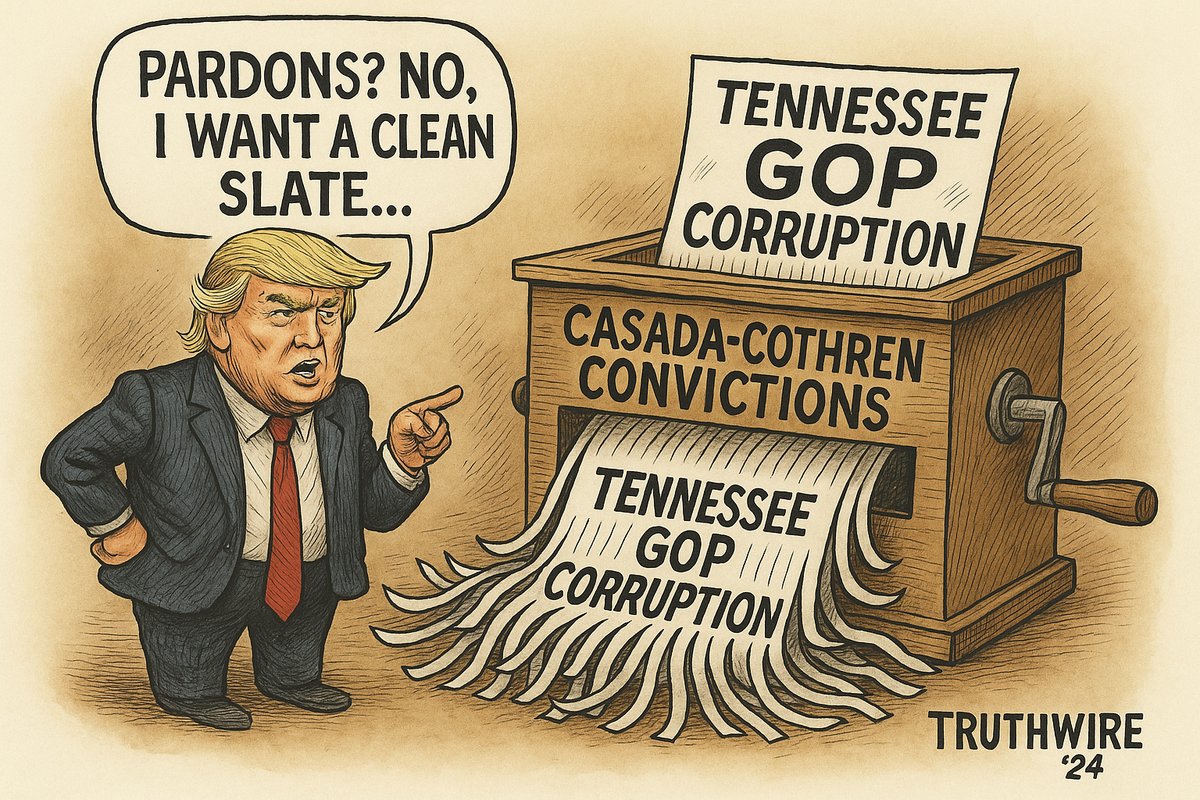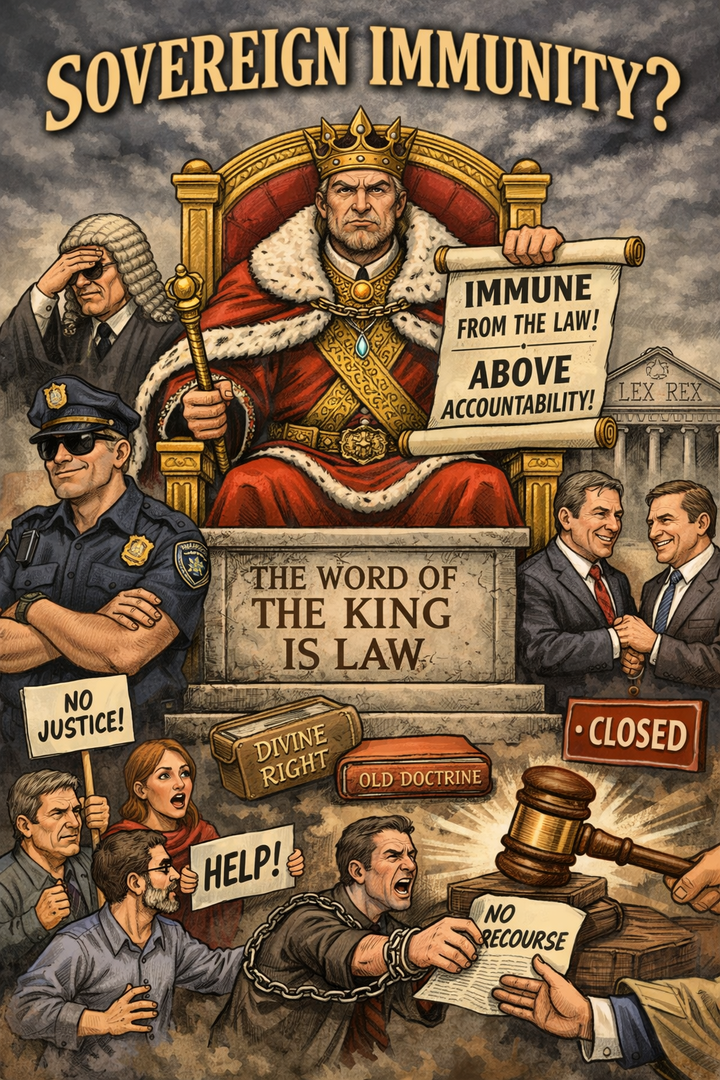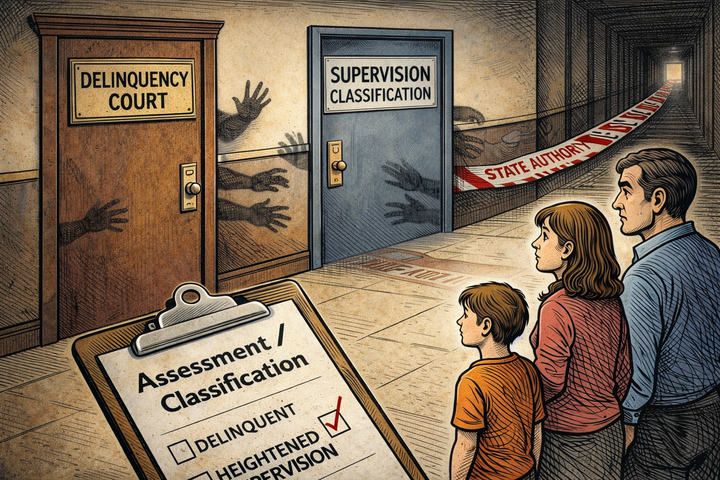Federal prosecutors now seek to erase the Casada–Cothren convictions entirely, even as Tennessee regulators revive a dormant PAC case. With vacatur underway and new state-level pressure rising, the battle over political lawfare in Tennessee is far from over.message to Tennessee’s GOP establishment.
The political aftershocks of the Casada–Cothren case grew even stronger last week when the U.S. Department of Justice filed an unopposed motion asking a federal judge to vacate both men’s convictions — an extraordinary step that goes far beyond the presidential pardons issued days earlier. A pardon forgives. Vacatur erases, wiping the conviction itself from the legal record as though it never existed. The federal government almost never requests such relief, and its willingness to do so in this case marks a dramatic turn in a prosecution that has been politically fraught from the beginning.
President Trump had already issued full, unconditional pardons to former House Speaker Glen Casada and former Chief of Staff Cade Cothren, declaring that both men were wrongfully targeted. But the government’s motion to vacate — effectively admitting that the judgments should be undone — carries a different weight. It signals that, at minimum, the legitimacy of the convictions has been called into question at the highest levels, even if no public filing formally rebuts the underlying allegations.

The pardons prompted swift criticism from Tennessee Republican leadership. Lt. Gov. Randy McNally called the decision “not correct.” House Speaker Cameron Sexton told Knoxville media that the case was driven by evidence, not politics, and emphasized that the FBI began investigating during Trump’s first term and that a Trump-appointed judge presided over the trial. Their refusal to support the pardons stood in sharp contrast to the former president’s position — and to the unprecedented motion the government filed shortly after.
Cade Cothren responded forcefully to the Tennessee leaders’ remarks, telling TruthWire:
“The Speaker and Lt. Governor can keep talking because their opinions don’t change the facts. President Trump reviewed the evidence, called me personally, declared my innocence after five years of political persecution, and granted a full pardon because the case was a sham from day one. I’m not surprised that certain establishment figures — including some who’ve faced their own public controversies — are now criticizing real justice. Tennessee is done with backroom politicians who bow to lobbyists, waste taxpayer dollars, and sell out the voters who trusted them. I am grateful to God and President Trump. The people are rising, and change is on the way to Nashville.”
One portion of Cothren’s statement references a controversy that surfaced in 2023, when The Tennessee Holler published screenshots showing Lt. Gov. McNally leaving emojis and comments on the Instagram posts of a young gay man. That story was widely covered by The Tennessean, WPLN, and national outlets. McNally denied wrongdoing, but the episode remains politically sensitive — and helps explain the pointed nature of Cothren’s rebuttal of McNally’s criticism.
Beyond the political sparring, the legal significance of the motion to vacate cannot be overstated. Vacatur is rare, particularly in a corruption case involving public officials. Typically, a presidential pardon ends the matter: the conviction stands in the record, but the punishment is nullified. Here, however, the government is asking the court to eliminate the convictions entirely. That move suggests that the DOJ under Trump sees some fundamental flaw in the prosecution or the surrounding circumstances. It also sends a signal to Tennessee’s political establishment — especially to those within the GOP who have publicly distanced themselves from the pardons.
Sources close to the defendants argue that vacatur confirms what they have maintained for years: that the case was constructed on politically motivated foundations and, at key moments, on information tied not to documentary evidence but to a circle of individuals with personal or political motives. Critics have long alleged that the inquiry gradually shifted away from its earliest targets — including questions surrounding the voucher legislation and the governor’s office — and instead narrowed toward an outcome that could satisfy an aggressive Biden-era DOJ. If that characterization is accurate, then vacating the convictions is not merely a legal correction but a rebuke of a prosecution path shaped by political pressures- not hard evidence.
For Republican leaders who oppose the pardons, the timing carries implications. The Trump administration is now taking steps not only to forgive Casada and Cothren, but to legally undo the federal conviction itself. That dual action — pardon plus full vacatur — seemingly sends a pointed message: the president believes the prosecution was fundamentally illegitimate, and he is prepared to use all tools available to reverse it. GOP leaders who continue to defend the original verdict and criticize the pardons, could find themselves increasingly isolated within the party’s shifting power structure.
Meanwhile, Speaker Sexton has argued that his office will continue combating corruption “no matter who is involved.” But with the conviction now in the process of being erased, the question is shifting: was this truly corruption, or was it a politically shaped narrative that hardened into charges under pressure? The federal court, not the Tennessee legislature, will answer that question when it rules on the vacatur request.
If granted — and given that the motion is unopposed, it almost certainly will be — the result is unheard of in recent Tennessee political history. The case will vanish from the books. The legal stain disappears. Cothren’s and Casada’s records will show no conviction at all.
But even as the federal case dissolves, another front is already opening in Tennessee.Within days of the pardons — and almost immediately after the government moved to vacate the convictions — the Tennessee Registry of Election Finance (TREF) revived its long-dormant inquiry into a 2020 political action committee tied to Cothren, the Faith Family Freedom Fund. The matter had been virtually inactive while the federal prosecution advanced; now, abruptly, it has become the centerpiece of a renewed enforcement push.
To many observers, the timing is not subtle. The federal punishment that elements of Tennessee’s political establishment expected — and vocally supported — is gone. The vacatur will erase the convictions entirely. And while state-level officials cannot undo that, they can attempt to impose civil penalties that would prevent Cothren from running for public office in Tennessee. Those penalties fall squarely within the Registry’s authority.
In that light, the resurrection of the PAC case looks less like routine oversight and more like the last remaining weapon available to a Nashville-centered bureaucratic structure that spent years insisting Cothren should be politically sidelined. Registry Chairman Tom Lawless argues that the issue stems from alleged irregularities in the PAC’s formation filings. But critics note that the case originated within the same political environment that shaped the now-collapsing federal prosecution — and that its sudden reappearance, after years of institutional dormancy, mirrors a long pattern of selective enforcement by TREF toward individuals aligned with President Trump, or conservative grassroots in Tennessee.
Whether deliberate or not, the message is unmistakable: if federal lawfare fails, state-level mechanisms will continue the fight. And as Tennessee enters a new political era — one in which a Trump-aligned DOJ is actively undoing prior cases it sees as a miscarriage of justice— the Registry’s renewed pursuit of Cothren may prove to be the most revealing development yet.
If you support what we do, please consider donating a gift in order to sustain free, independent, and TRULY CONSERVATIVE media that is focused on Middle Tennessee and BEYOND!





Comments ()